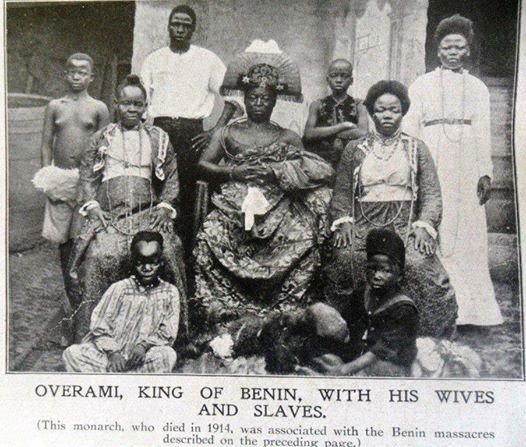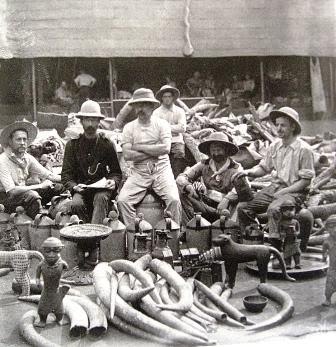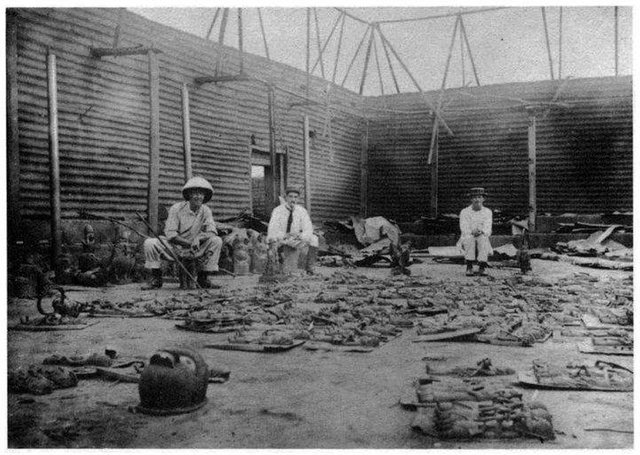The Benin Massacre and Expedition of 1897
The Benin massacre and the Benin expedition of 1897 are two separate historical events that cannot be discussed in isolation. The Benin expedition was a punitive expedition carried out in 1897 by the British authorities as a way of punishing the Benin Kingdom.
The expedition was led by Admiral Sir Harry Rawson in retaliation to a previous ambush of a British-led party under the command of Acting Consul General James Phillips by some Benin soldiers. James Phillips and some of his men, mainly of African origin, were killed in the ambush, which has become known in History textbooks as the Benin Massacre.
Sir Harry Rawson and his party succeeded in raiding, burning, and capturing Benin. Several precious artifacts of Benin origin were looted and taken to Britain and the then Oba(king) of Benin, Oba Ovoramwen, was captured and deposed to Calabar where he died in 1914.
Background
Towards the fall of the 19th century, British presence in West Africa had gained prominence but the Benin Kingdom was still independent politically and economically. The Oba of Benin exercised great monopoly over trade in valuable goods such as palm oil, rubber, ivory, pepper, etc. The Benin Kingdom, possessing one of the most powerful military in the region, was not subjected to the authority of any kingdom, even the Great Britain. As it would be expected, the British did not like this dominance and, therefore, sort to annex Benin into the British empire.
In 1892, some five years before the expedition, Henry Gallway, a British Vice Consul, visited Benin with the intention of annexing the vast kingdom through a treaty clandestinely tagged, trade and friendship. Oba Ovoramwen Nogbaisi, although highly skeptical about the real intentions of the treaty, signed it. Shortly afterwards, on realizing that the treaty would limit his authorities, Oba Ovoramwen instructed his people not to trade with the British merchants.
 Expectedly, the British merchants found the actions of Oba Ovoramwen deadly and capable of undermining the colonial interests of Great Britain in the whole of West Africa. Therefore, the British merchants persuaded the Acting Consul-General James Robert Phillips to depose Oba Ovoramwen, so that they can have unhindered access to trade and commerce. So, in November 1896, James Phillips sent a request to London seeking permission to invade Benin and depose Oba Ovoramwen.
Expectedly, the British merchants found the actions of Oba Ovoramwen deadly and capable of undermining the colonial interests of Great Britain in the whole of West Africa. Therefore, the British merchants persuaded the Acting Consul-General James Robert Phillips to depose Oba Ovoramwen, so that they can have unhindered access to trade and commerce. So, in November 1896, James Phillips sent a request to London seeking permission to invade Benin and depose Oba Ovoramwen.
However, without waiting for approval from the British Crown, James sent a message to Oba Ovoramwen that would be paying him a visit to discuss peace and trade. Unknown to Phillips', Oba Ovoramwen had got news from some Itsekiri chiefs about what Phillips' real intentions in Benin were. So, Oba Ovoramwen called a meeting of his chiefs to discuss the crucial matter regarding visit.
The Benin Massacre of 1897
In late December 1986, Phillips and his friendly forces made up of two Niger Coast Protectorate Force officers, a medical officer, two trading agents, and 250 African soldiers masquerading as porters, embarked on a military expedition to Benin Kingdom. To disguise their true intentions, the forces hid their weapons in the baggage carried by the porters.
Meanwhile, at the meeting called by Oba Ovoramwen Nogbaisi, there was a hefty debate regarding the true intentions of Phillips and his friendly forces. Oba Ovoramwen argued that Phillips and his party should be allowed to enter Benin Kingdom and never attacked except there was any tangible reason to act otherwise. Nevertheless, the Iyase who was the commander-in-chief of the Benin soldiers ignored the suggestions of the Oba. Iyase sent Ologbosere, a senior and revered Benin military officer, to Ughoton where Phillips and his men were camped, to destroy them.
On January 4, 1897, Ologbosere and his men caught Phillips and his friendly forces completely unprepared at Ugbine, a small village near Ughoton. Since Philips was not expecting an attack, his pistol was out of reach. Ologbosere and his men attacked, killing Phillips and several others. Only two British survived the bloody attack.
The Benin Expedition of 1897
On hearing the untoward news of Phillips' death, the British authorities decided to immediately punish Benin. Consequently, on 12th January 1897, Harry Rawson was appointed to lead an invasion of Benin. Rawson's forces comprised of 1,200 Royal Marines, sailors and Niger Coast Protectorate forces. The commanding officers were given clear orders and objectives, namely:
To burn down all the towns and villages in Benin Kingdom.
To capture Oba Ovoramwen and hang him wherever and whenever he was found.

On February 9th 1897, Rawson and his forces entered Benin. The Benin forces fought gallantly with the crude weapons (cutlasses, bows and arrows, axes, spears, knives, stones, etc) at their disposal but were overpowered by the sophisticated British fire power. Rawson's forces succeeded in burning all the houses in the Benin kingdom, including places of religious worship. Oba Ovoramwen was captured and sent on exile to Calabar where he died in January 1914.
Effects
The Benin kingdom was handicapped economically and politically. The deportation of Oba Ovoramwen to Calabar, for instance, created an interregnum of about 17 years. This was because the primogenitural Benin tradition would not allow a new king to assume the throne as long as the old king was alive and kicking.
Artifacts of great historical significance were looted, auctioned off, and taken to the British museum in London. To this day, pressure is being exerted on the British government to return the artifacts to the rightful place.
The annexation of Benin and other neighbouring towns by the British.

References
Akenzua, Edun (2000). “The Case of Benin”. Appendices to the Minutes of Evidence, Appendix 21, House of Commons, The United Kingdom Parliament, March 2000.
Sir Ralph Moore to Foreign Office. Reporting on the abortive Expedition into Benin. 1895 Sept.12 Catalogue of the Correspondence and Papers of the Niger Coast Protectorate, 268 3/3/3, pg. 240. National Archives of Nigeria
E. Ola Abiola; A Textbook of West African History; 3rd edition; Ado Ekiti; Omolayo Standard Press & Bookshops co. (Nig.) Ltd; 1984
J. W. Nyakatura, Anatomy of an African Kingdom: A History of Bunyoro – Kitara, Translated by Teopista, edited with an introduction by G. N. Uzoigwe (New York: Nok Publishers International, 1973), pp. 101-130
J. U. Egharevba, A Short History of Benin, 3rd edition (Ibadan: I.U.P., 1960), P. 49
P. A. Igbafe, “Indirect Rule in Benin”, Tarikh, vol. 3. No. 3 (1970), p. 31.
P.s: This article was compiled by @gandhibaba after weeks of research about the subject. The author aims to promote the history of Africa to the world and enriching the Steemit Community with valuable articles in the process.
.jpeg)
hmmm... I take a deep breath. I always love reading about the then powerful Benin kingdom. My father told me this story as a child and he said they use to teach kids in school during his time. I wonder why we do not tell kids about our past anymore.
sooner or later, I know those artifacts will be returned.
upvoted and resteemed
The Benin kingdom is surely a great kingdom, full of awe and mightiness. Some of the artifacts have been returned but, like you, I hope many money will be returned.
Thanks for your commenting and resteeming. I appreciate you.